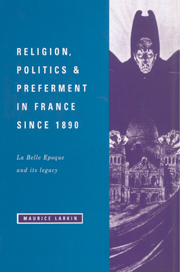Book contents
- Frontmatter
- Contents
- Preface
- Part 1 As it was: Catholics and the Republic, 1890–1914
- Part 2 As it was: Catholics and state employment, 1890–1914
- Part 3 As it became, 1914–1994
- 9 La grande illusion? 1914–1939
- 10 The leopard's spots: 1940–1960
- 11 Croquet through the looking glass: rules and identity in question, 1960–1994
- Map: Religious observance in France, c. 1960.
- Notes
- Sources
- Index
9 - La grande illusion? 1914–1939
Published online by Cambridge University Press: 27 January 2010
- Frontmatter
- Contents
- Preface
- Part 1 As it was: Catholics and the Republic, 1890–1914
- Part 2 As it was: Catholics and state employment, 1890–1914
- Part 3 As it became, 1914–1994
- 9 La grande illusion? 1914–1939
- 10 The leopard's spots: 1940–1960
- 11 Croquet through the looking glass: rules and identity in question, 1960–1994
- Map: Religious observance in France, c. 1960.
- Notes
- Sources
- Index
Summary
With the inter-war years, the concerns of this book enter a world of closed sources that limit investigation to the well-worn path of printed material. The availability of the Vatican archives ceases with the death of Benedict XV in 1922, while the 120-year rule governing the personal dossiers of French civil servants is even more difficult to circumvent for this period than it is for the pre-war years. Such material that has slipped the net is largely the fortuitous outcome of broad-band cataloguing – usually in sectors where the modest number of personal dossiers has resulted in a wide age-group being stored in the same boxes – or occasional misplacement. In both cases it is too sparse to be usefully illustrative, let alone a reliable reflection of how things were. Nor is there a compensating improvement in other sources. Old boys' records in private schools had yet to acquire the systematic thoroughness of the fund-raising revolution of recent times; and those retired fonctionnaires who still survive to relate their experiences were mostly entering their careers in the mid-1930s or later.
Such evidence as there is, however, suggests that matters had not greatly changed since the pre-war decades of the Third Republic. There was admittedly no recrudescence of Combism; and even the Herriot government's brief anticlerical offensive in the mid-1920s was largely a counterattack against what it perceived as the creeping subversion of the Republic's achievements in secularising France. Yet there was still a wariness about entrusting ministerial portfolios to committed Catholics or appointing them to the corps préfectoral.
- Type
- Chapter
- Information
- Religion, Politics and Preferment in France since 1890La Belle Epoque and its Legacy, pp. 147 - 173Publisher: Cambridge University PressPrint publication year: 1995

